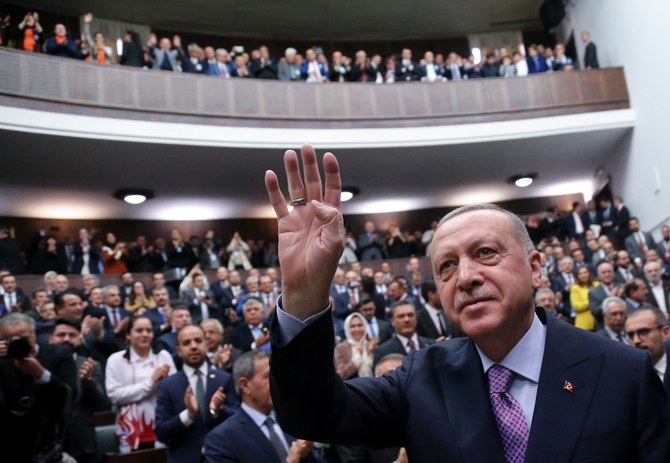
- ARAB NEWS
- 02 Jul 2025

Turkey’s brinkmanship, which has characterized its diplomacy in Syria, has exhausted its value. President Recep Tayyip Erdogan now has to decide on his crucial next steps: Accommodation with the Syrian government and its ally, Russia, or a war that could alienate Turkey from Moscow, its political, military, energy and economic partner.
Events over the last month have steadily sharpened the divide between Turkey and Russia, reflecting their deep differences about the future scenario in Syria. In this period, Syrian forces, backed by Russian air support and Iran-backed militants, have made remarkable progress in retaking towns and villages in the extended Idlib area; occupying Maaret Al-Numan on Jan. 26 and then Saraqeb, just 10 kilometers from Idlib city, on Feb. 6. Taking Saraqeb, at the junction of both the M5 highway from Aleppo to Damascus and the M4 from Aleppo to Latakia, created the conditions for the reopening of these two economic lifelines. However, Turkey-backed rebels announced they had retaken the town on Thursday.
Several of Turkey’s observation posts are now surrounded by Syrian troops. In sporadic skirmishes, 16 Turkish soldiers have been killed this month. Over the last two months, the fighting has displaced nearly a million Syrians, who have rushed to the Turkish border for safety.
So far, most of the fighting on Turkey’s behalf has been done by the Syrian National Army (SNA), which is made up of elements of the old rebel group, the Free Syrian Army, that has now come under Turkish patronage, augmented by local Turkmen and Arab fighters. There are reports that Turkish forces are also working closely with extremist elements in Idlib, particularly Hayat Tahrir Al-Sham (HTS) and the National Liberation Front (NLF). HTS is believed to control most of Idlib and, with the NLF, leads the fighting there, including counterattacks against Syrian forces.
Turkey’s ties with HTS are central to its interests in northern Syria and are the source of conflict with the Assad regime and Russia. In terms of the Sochi agreement of 2018, Turkey agreed to separate the extremist fighters from the “moderates,” integrate the latter with the SNA, and open the door for the Syrians and Russians to fight the extremists and take back Idlib. Over the last 18 months, Turkey has not been able to achieve this. HTS refuses to join the Turkey-sponsored “moderate” entity, instead wishing to adhere to its ideals and fight to the bitter end — hence the decision of Syria and Russia to end the impasse and open hostilities.
Putin has made tough statements squarely blaming Turkey for the differences and affirming support for the Assad government
Talmiz Ahmad
This is a body blow to Turkish interests. The rebel fighters at Idlib give it the firepower it needs to maintain its presence in northern Syria, keep the Syrian Kurds under control, and remain an influential factor in shaping the future political order in Syria. On the other hand, both Damascus and Moscow are viscerally hostile to the extremists and advocate the withdrawal of Turkish troops to ensure the territorial integrity of Syria.
The ground fighting has been marked by parallel diplomatic efforts to bridge differences and avoid escalation. The most important interaction was the one in Moscow on Feb. 18. There, Russia offered the principles of a settlement: The setting up of a 15-kilometer-wide de-escalation zone at the Syria-Turkey border; Russian checkpoints in the Turkish-controlled parts of Idlib and Afrin; and the opening of the M5 and M4 highways, with traffic under joint Russian-Turkish control.
Turkey rejected this plan, since it would deprive it of all its territorial gains in the region. It demanded instead that Syrian forces vacate all the areas occupied in the recent fighting. Ankara has now deployed about 10,000 soldiers on the outskirts of Idlib, facing the Syrian forces and thus setting the stage for a direct conflict between them.
Amid these escalating tensions, Erdogan has continued his brinkmanship — he paid a visit to Ukraine in early February, criticized the occupation of Crimea by Russia, and offered military assistance to Kiev. He then called Vladimir Putin to clear the air. He has also spoken to US President Donald Trump and obtained statements of support on Idlib from Secretary of State Mike Pompeo. Erdogan has also asked for Patriot missiles, but this request has not been accepted, while the US has refused to join the fighting in Syria.
Putin has responded with tough statements squarely blaming Turkey for the differences and affirming support for the Assad government. Russia has also reached out to the Syrian Kurds, who are feeling betrayed by Trump after he gave Turkey a free hand last October to intervene militarily in their territories east of the Euphrates. Now, under Russian encouragement, they seem amenable to engaging with the Assad government.
Observers are speculating about the next turn of events — an all-out war, a significant Turkish shift in favor of the West, particularly the US, or a compromise arrangement broadly along the lines of what was offered by Russia last week? Erdogan has made some bellicose statements demanding the withdrawal of Syrian troops from around his observation posts by the end of the month, but has also acknowledged he does not control the airspace. It is unlikely that he will jeopardize Turkey’s substantial ties with Russia. Perhaps what the situation needs is a face-saving formula that would appear to serve at least some of Turkey’s interests; possibly Russian support for its outreach to Libya and its interests in the Eastern Mediterranean.
The outcome of this imbroglio should be known over the coming few days.